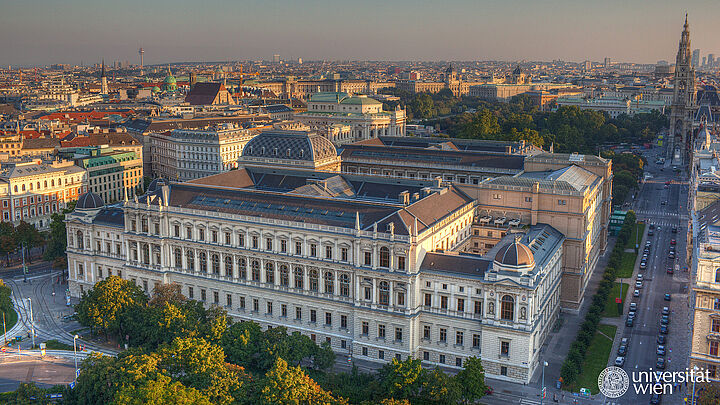Dienstag, 21. Mai 2019, 09:00 - 17:00 iCal
All Together or Me First?
How the European Union and Russia see the Future of Multilateral Diplomacy
Landesverteidigungsakademie Wien (Sala Terrena)
Stiftgasse 2a, 1070 Wien
Konferenz
Programmauszug:
09:30 – 11:00
Panel session. Does Multilateral Diplomacy Have a Future? Viewsof Russia and the EU
Challenges to efficient multilateral cooperation in the modern world are so large-scale that many believe that this very model of interaction has finally collapsed. Egoism begins to dominate many spheres of international life. The “me first” principle first employed by the United States is becoming more widespread. Taking their cue from the United States, many countries begin to rely on unilateral measures instead of aspiring for a harmony of interests. And where it is declared as a goal, for example, in China’s international projects, an exacerbation of rivalry often takes place. Have we entered a new era of the “war of thrones” or is it just a new stage of turmoil, to be followed by a new model taking shape?
Moderator: Fyodor Lukyanov, Research Director of the Foundation for Development and Support of the Valdai Discussion Club
Speakers:
• Thomas Greminger, Secretary General of the OSCE
• Alexander Grushko, Deputy Minister of Foreign Affairs of the Russian Federation
• Konstantin Kosachev, Chairman of the Federation Council’s Committee on International Affairs
• Johannes Peterlik, Secretary General in the Federal Ministry of Europe, Integration and Foreign Affairs of the Republic of Austria
• Asle Toje, Research Director at the Norwegian Nobel Institute
• Lassina Zerbo, Executive Secretary of the Comprehensive Nuclear-Test-Ban Treaty Organization
13:00 – 14:30
Session 1. European Security Post Arms Control. The Threat to
Peace and How to Oppose It
2018 was a watershed year for arms control and strategic stability. Two decisions of the Trump administration – to quit the “Iran deal” and the INF Treaty – in fact drew a line under the old model of relations in the nuclear sphere. What are they to be replaced with? Will the nuclear powers be able to adapt to the new situation the principles of mutual deterrence and strategic restraint that ensured peace in the Cold War era? What can this adaptation look like and what role can Europe play?
Moderator: Wolfgang Peischel, Brigadier General, Editor-in-Chief of the
Austrian Military Journal
Speakers:
• Thomas Gomart, Director of French Institute of International Relations (ifri)
• Gunther Hauser, Institute for Strategy and Security Policy, National Defence Academy
• Igor Istomin, Associate Professor, Department of Applied International Analysis, MGIMO University
• Christian Stadler, Head of the Research Center for Polemology and Legal Ethics, University of Vienna | National Defence Academy
• Mikhail Ulyanov, Permanent Representative of the Russian
Federation to the International Organizations in Vienna
15:00 – 16:30
Session 2. Are Sanctions a New Global Regulator? Reducing the Collateral Damage of Economic Wars
The global economy is changing: protectionist trends are on the rise throughout the world, universal rules more and more often fall victim to selfish approaches and separate deals. Trade and economic wars (socalled sanctions) are becoming not only a method of political pressure, but also a way of transforming the economic reality in the interests of stronger actors. How will economic entities build their relations in an increasingly fragmented world? Are economic restrictions becoming the most efficient way of promoting one’s interests?
Moderator: Ivan Krastev, chairman of the Centre for Liberal Strategies, Sofia
Speakers:
• Christof van Agt, Senior Energy Analyst, International Energy Forum
• Vasily Astrov, Senior Researcher, Vienna Institute for International Economic Studies (wiiw)
• Stephan Barisitz, Senior Researcher, Oesterreichische Nationalbank (OeNB)
• Reinhard Krumm, Head of Regional Office for Security and Peace in Europe, Friedrich-Ebert-Stiftung
• Alexander Shokhin, President of the Russian Union of Industrialists and Entrepreneurs
• Ivan Timofeev, Programme Director of the Valdai Discussion Club, Programme Director of the Russian Council of International Relations
Veranstalter
Forschungsgruppe für Polemologie und Rechtsethik, Universität Wien
Um Anmeldung wird gebeten
Kontakt
Dr. Alexander Dubowy
Institut für Rechtsphilosophie
Forschungsgruppe für Polemologie und Rechtsethik
01 4277 358 07
alexander.dubowy@univie.ac.at
Erstellt am Montag, 13. Mai 2019, 11:49
Letzte Änderung am Dienstag, 14. Mai 2019, 11:26

